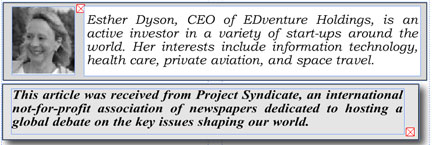By Esther Dyson
PHUKET – Marissa Mayer, the new CEO of Yahoo!, recently created a fuss by issuing an edict that forbids anyone at the company to work from home. Mayer’s demarche received a lot of press coverage, probably more than it deserved. That may not be so surprising: she is a woman, and she allegedly has a nursery for her baby next door to her office. Above all, people seemed to react to the categorical nature of her decision (why everyone?) and to the irony that Yahoo! is a tech company (don’t they know about Skype?).
I think that Mayer made the right decision, and I am sure that over time exceptions to her order will be allowed at managers’ discretion. But, until now, the “right” to work at home was sacrosanct at Yahoo!, something that an employee’s manager could not overrule. And, by all accounts, enough people at Yahoo! were not working, either from home or from more interesting places, that it had become a serious problem.
Beyond that, Mayer’s edict makes more sense as a means of cultural change within a business than it does as a way to improve any particular individual’s productivity. Almost precisely because working remotely is easy, the advantage that a workplace has over a collection of home workers – or a set of outsourced workers assembled through Task Rabbit – is that people can accomplish more in a setting that provides a common culture and the benefit of serendipitous connections.
 Long ago, the advantage of a firm was that it lowered transaction costs (an idea first clearly expressed by the Nobel laureate economist Ronald Coase), such as the costs of finding workers, assigning them to tasks, assessing productivity, and setting salaries. Now that transaction costs are so low, the primary benefit of working at work is that the physical interactions foster an organisational culture and boost creativity, rather than efficiency or productivity, within an established routine. Mayer, I think, did not order her employees back to the office merely because some people were not actually working at home; rather, many of those who were working were not working together.
Long ago, the advantage of a firm was that it lowered transaction costs (an idea first clearly expressed by the Nobel laureate economist Ronald Coase), such as the costs of finding workers, assigning them to tasks, assessing productivity, and setting salaries. Now that transaction costs are so low, the primary benefit of working at work is that the physical interactions foster an organisational culture and boost creativity, rather than efficiency or productivity, within an established routine. Mayer, I think, did not order her employees back to the office merely because some people were not actually working at home; rather, many of those who were working were not working together.
To be sure, it seems contradictory to some people that Yahoo!, an online business, requires its employees to be physically present in the company’s offices. But most of the money and talent in this industry already seem to concentrate physically in one small part of the United States, between San Francisco and San Jose. Whether it’s the Yahoo! Cafeteria (now more inviting and more frequented with the advent of free food), or the halls of the Plug & Play startup accelerator, proximity matters. Being physically present at work means direct contact with other sharp and creative minds. And the benefits of human contact and interaction are why salespeople still call on customers instead of using Skype, and why Meetup (which supports organisers of face-to-face meetings; I am on the company’s board) changes lives in ways that Twitter and Facebook rarely do.
Of course, those who prefer to work at home cite not just the cost and time of commuting, but also the proliferation of meetings – too much culture, perhaps – and a steady flood of communication that simply interrupts their work rather than enhancing it. Interestingly, I heard this point at a WPP Stream “unconference” in Phuket, Thailand, where a couple of hundred people had flown thousands of miles to meet face to face to share ideas and strengthen working relationships.
So, yes, online work can make a lot of sense in many situations, but when you are trying to fix a broken corporate culture, you need the commitment, human engagement, and creative interaction that happen most consistently in a physical workplace. In the end, it is up to good managers to decide who can work where, and to make meetings short and useful.
Indeed, the whole point of having managers is that they are supposed to exercise judgment. Otherwise, computers and the Internet would allow us not just to work from home, but to report to a software programme rather than to a person.
But, in the end, the challenge is to find the right fit between people and environment. Personally, I come at this from the opposite direction. As an independent angel investor with no real day job, I don’t have an office to report to every day. But I would miss the companionship of people working around me – even if they do not necessarily work with me.
Fortunately, Meetup allows me to sit at a desk amid its roughly 90 people; I travel a lot, but I work from a desk at Meetup whenever I am at “home” in New York City. True, I don’t have to go to the company’s meetings, but I like being surrounded by busy people; I know it makes me work harder. Whatever our work, we remain physically social beings.









